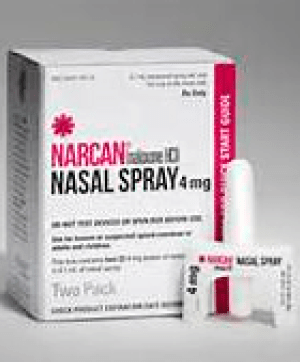 Naloxone is a medication used to counter the effects of opioid overdose. Morphine, Percocet and heroin are in that class of drugs. Naloxone is used to counteract life-threatening situations by allowing an overdose victim to breathe normally. It’s a non-addictive medication now available without prescription in North Carolina. Governor McCrory recently signed legislation making naloxone more accessible. “It has already saved the lives of 3,300 North Carolinians,” he said. North Carolina is the third state in the country to issue a standing prescription order statewide for naloxone.
Naloxone is a medication used to counter the effects of opioid overdose. Morphine, Percocet and heroin are in that class of drugs. Naloxone is used to counteract life-threatening situations by allowing an overdose victim to breathe normally. It’s a non-addictive medication now available without prescription in North Carolina. Governor McCrory recently signed legislation making naloxone more accessible. “It has already saved the lives of 3,300 North Carolinians,” he said. North Carolina is the third state in the country to issue a standing prescription order statewide for naloxone.
Naloxone is traditionally administered by emergency response personnel. Fayetteville police were first equipped with it just over a year ago, according to police Captain Lars Paul. All patrol officers and narcotics detectives carry it. Paul says a company that makes the drug provided the department with several hundred does of Naloxone. EVZIO is a hand-held, single-use naloxone auto-injector developed by Kaleo Pharma of Richmond, Virginia. EVZIO should be given right away and does not take the place of emergency medical care. “EVZIO kits of two injectors and audio instructions are expensive, costing nearly a thousand dollars,” Paul said. Now however, an inexpensive Naloxone nasal spray is on the market and available over the counter for about $12. Improperly used prescription pain medications like Percocet and oxycodone are still the number one cause of opiate overdoses. But, stricter federal regulations governing them are making them harder to get and more expensive. Paul says “people start off using legitimate prescription pain killers and then turn to heroin as a cheaper option.”
Dr. Steven Stack, the 170th president of the American Medical Association, recently issued an open letter to America’s physicians on the opioid epidemic. It read in part “The medical profession must play a lead role in reversing the opioid epidemic that, far too often, has started from a prescription pad. For the past 20 years, public policies — well-intended but now known to be flawed — compelled doctors to treat pain more aggressively for the comfort of our patients. But today’s crisis plainly tells us we must be much more cautious with how we prescribe opioid. Tens of thousands of Americans are dying every year and more still will die because of a tragic resurgence in the use of heroin.”
Alternative forms of pain management may reduce the use of addictive drugs. Experts agree that medication is a necessary and sometimes lifesaving part of the pain-management equation. The latest trend, said Steven Stanos, D.O., medical director of the Rehabilitation Institute of Chicago Center for Pain Management, is to take a more comprehensive approach to treating chronic pain, a “bio-psycho-social approach.” The “bio,” or biological, part means treating the physical or underlying root causes. The “psycho,” or psychological, part addresses the depression, fear and anxiety that can accompany chronic pain. The “social” part pertains to a patient’s ability to function in society. Very few doctors have specialized training in pain management. In fact, only three percent of U.S. medical schools offer courses in it. In Fayetteville, there are 15 doctors who specialize in chronic pain management ranging from acupuncture to therapeutic laser treatment.

 How to resolve AdBlock issue?
How to resolve AdBlock issue? 








